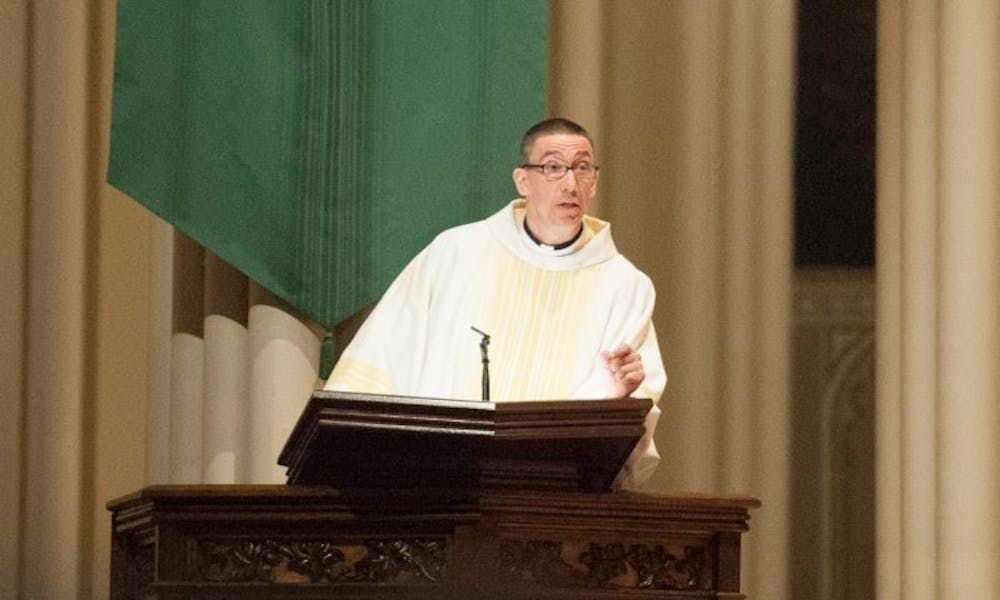On Friday mornings this semester, six seminarians and three laypersons gathered in a Malloy Hall seminar room for Preaching III, a master of divinity class taught by Fr. Michael Connors.
One focus of the class was learning how to deliver homilies at special occasions, such as funerals or weddings. Another was investigating how to proclaim a “prophetic word” attentive to biblical justice and Catholic social teaching.
In line with the latter end, the class read a chapter from the Rev. Luke Powery’s book, “Dem Dry Bones: Preaching, Death, and Hope,” in preparation for a discussion held on April 5.
Powery is a Black Baptist minister and the dean of Duke University Chapel. He’s an up-and-coming “star” in the world of homiletics, according to Connors, who directs Notre Dame’s 41-year-old Marten Program in Homiletics and Liturgics.
After a student lead the class in prayer, Connors got the conversation rolling by asking if anyone in the room had ever been to a Black church. Three or four hands went up.
Next Connors inquired about what the class found interesting and puzzling in the reading.
The first four students to enter the discussion said they were struck by what Powery wrote regarding hope. Chris Mulholland, a temporarily-professed seminarian, was the fourth student to speak. He directed the class to a passage, in which Powery analyzed “Steal Away,” a Black spiritual.
The chorus of the spiritual goes: “Steal away, steal away, steal away to Jesus! / Steal away, steal away home, I ain’t got long to stay here!”
Powery wrote that preaching should generate the type of hope which “steal away” generated for slaves. But Mulholland said he was worried that the spiritual might not generate hope about life on Earth.
The seminarian said one might hear the chorus and think: Earthly life and its inherent suffering must just be things to “get through,” and the only real home for humans is in heaven. “It’s kind of very not helpful,” he said.
Responding to Mulholland’s concern, a lay student said spirituals sometimes contained hidden messages regarding how to escape slavery. Mulholland speedily found a couple sentences where Powery explained the double meaning of “Steal Away,” and he read them out loud.
“This spiritual could be about ‘stealing away’ to the home known as heaven, but it also could be a call to ‘steal away’ to a free, physical place or a secret meeting among the slaves,” Powery wrote. “The hope voiced in this musical sermon is double-voiced; it is about another world and this world.”
Once the conversation on hope died down and following a few comments on the role of the imagination in preaching, Connors read aloud a statement he flagged in the chapter regarding the spoken word’s capacity to generate light.
The priest then asked the class about their confidence in the spoken word — in preaching and other realms of life — considering the inundation of media in modern life.
Lauren Walatka, one of the lay students, said in her experience, words have been more likely to “kill” than give rise to something positive.
When Connors wondered aloud if Walatka had examples in mind, she recounted a homily delivered recently at her church that mentioned transgender people. “Some of the people in the pews were transgender or their children are — and those kids I’ve not seen back at church,” Walatka said.
Later the discussion moved on to the power of words in music and the effectiveness of brief homilies. The students also pondered whether to convey a homily’s most important points in the opening — before members of the congregation begin zoning out. (The class syllabus states that homilies should last about seven to nine minutes).
April 5 was the first time Preaching III met after Easter, so the class concluded its discussion by reflecting on the preaching students encountered during the Triduum.
Walatka said the preaching she heard at a morning prayer on Good Friday repeatedly used the line, “I thirst.” In the Gospel of John, Christ says “I thirst” just before dying on the cross. The line was returning to Walatka when she prayed, she said.
Mulholland said University President Fr. John Jenkins “crushed it” at the 10 a.m. Mass in the Basilica on Easter.
“I shouldn’t have been surprised,” he said, causing the class to chuckle. “His first line was, ‘Today is the day that makes us Christians.’”
A roughly 25-minute lecture from Connors on “preaching the just word” followed the 50-minute discussion. When the lecture ended, the class walked from the seminar room to the chapel in Malloy Hall. In the chapel, three students practiced delivering a homily.










